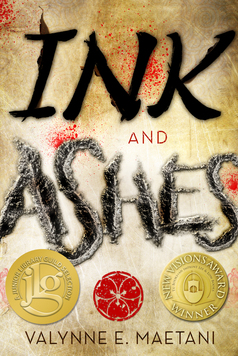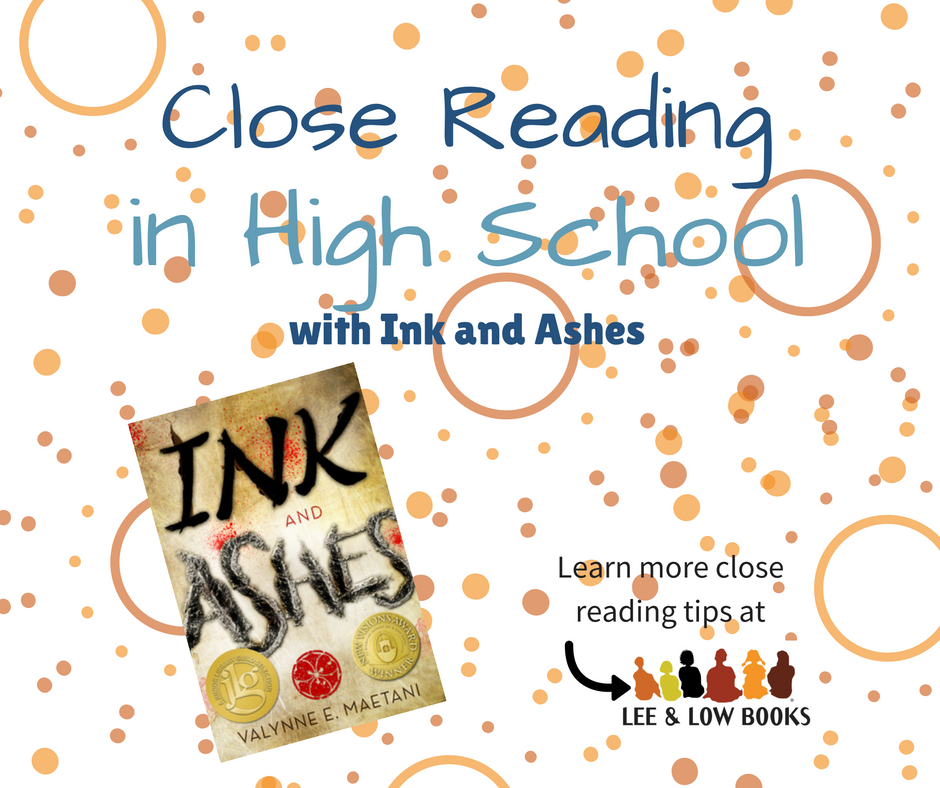 Featured title: Ink and Ashes
Featured title: Ink and Ashes
Written by: Valynne Maetani
Synopsis
When Japanese American Claire Takata finds out that her deceased father was once a member of the yakuza, a Japanese crime syndicate, danger enters her life that could end up killing someone. Winner of Tu Books’ New Visions Award, Ink and Ashes is a fascinating debut novel packed with romance, intrigue, and heart-stopping action.
Themes: trust, honesty, honor, family, teamwork, forgiveness
 Honors include:
Honors include:
- New Visions Award, Tu Books, an imprint of Lee & Low Books
- Best Children’s Books of the Year, Bank Street College of Education
- Junior Library Guild Selection
- Texas Lone Star Reading List, Texas Library Association Young Adult Round Table
- Asian/Pacific American Award for Literature, Young Adult Honor, Asian/Pacific American Librarians Association
- Best Books of the Year, Kirkus Reviews
- Starred review, Kirkus Reviews
- Best Fiction Book, Salt Lake City Weekly
Questions for Close Reading
Use the following text-dependent questions to help students practice close reading. You can use these questions for students’ written analysis or oral discussion. To build skills in close reading of a text and critical thinking, students should refer to and cite passages in the book to support their responses.
- Why is Claire being targeted instead of her parents or brothers? Why is anyone being targeted at all?
- What motivates Claire’s mother to keep the information about her husband from her children? Is she selfish or selfless in keeping this information? How so? Is it ever okay for someone to keep information from or give misinformation to someone else? Why or why not?
- What are some signs that Claire’s father was a part of the yakuza? What makes the yakuza life attractive to Claire’s father? Do you think his family and economic circumstances excuse or justify his decision to join the yakuza? What are the (positive and/or negative) consequences of his involvement with the yakuza?
- Claire is hurt by her parents’ choice to keep information from her even in hope of keeping her brothers and her safe. Yet, she later deliberately keeps information from her brothers as she uncovers more of pending dangers. Why do the characters have such a difficult time with honesty when safety is at risk?
- What causes Claire’s father to decide to leave the yakuza? What changes for him?
- Why does Claire’s father have a missing pinky? What did he hope this gesture would guarantee him? Was he successful? Why or why not?
- How do Claire’s father and stepfather meet and become friends? Is/Was Claire’s stepfather a part of the yakuza?
- How does Claire’s stepfather help her? Why does he help her?
- How are Arakaki and Claire similar?
- What is the significance of Claire’s name?
- Why do Mumps and Chase hate Claire? Are they reasonable in feeling this way towards her? How does technology/the Internet exacerbate misconception and frustration?
- Why might Claire’s father, Henry Sato, decide to become a judge after leaving the yakuza? How might his experiences in the yakuza help him in his new career as a judge? Is it appropriate for him to be a judge? How are a judge and a member of the yakuza both concerned with justice? Do they have similar visions or interpretations of justice?
- How does shame influence both Chase and Arakaki to hurt Claire? What are the roots of each of their perceived dishonor? Why do they think hurting Claire will help them find closure?
- Does learning the truth about her family and father’s past change how Claire feels about her father, stepfather, and/or mother? Does this new information and experience in uncovering the information change Claire? Why or why not?
- How does Maetani use Claire’s letters to her father throughout the book to demonstrate how Claire has changed? How is Claire the narrator different from Claire the letter writer?
- If Claire were to write one more letter to her father at the end of the book, what do you think she would say or ask him? Do you think she would forgive and accept him or has too much changed?
 Maetani has said she wanted to create a book she never got to read: a contemporary title with a Japanese protagonist. In your experience, does the book reinforce or shatter stereotypes of Japanese culture?
Maetani has said she wanted to create a book she never got to read: a contemporary title with a Japanese protagonist. In your experience, does the book reinforce or shatter stereotypes of Japanese culture?
Further reading on close reading and text complexity:








